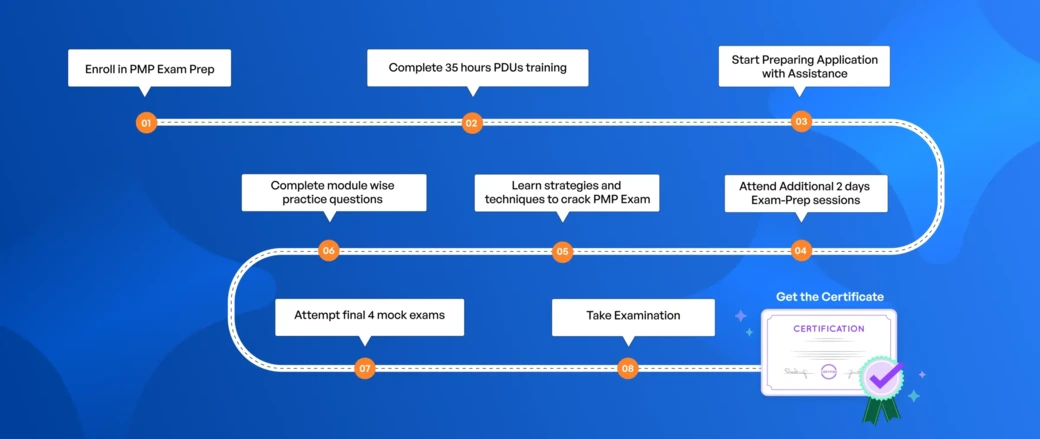Regarding the PMP career path, there are different certifications based on your experience level and career goals. The employment opportunities are ample for certified professionals across varied fields. The demand for PMP certification career paths is also on the rise consistently. It is essential to mention that the PMI certifications are not necessarily ladders in the sense that one credential is not a prerequisite for the others. On that note, here's a brief outline of the PMP career path and the future scope of the certification.
Also Read: PMI ACP Vs PMP
Project Manager Career Path - An Overview
1. Gain experience in any industry
A project manager doesn’t start as a Project Manager, rather they make their way to become a project manager. For example, you start as a software developer and then become a software project manager. Gaining experience will give you an advantage over others if your long-term career goal is to become a project manager.
Establish a Strong Foundation: Learn the Essentials of Cost Baseline Creation!
2. Get on an entry-level position
When you are starting as a project manager, you will be offered roles like:
- Project Coordinator
- Assistant Project Manager
- Associate Project Manager
- Junior Project Manager
- Also Read: Activity Duration Estimates
Working in these positions will help you gain relevant experience and secure your position as a project manager further. You will gain experience on how to manage, overlook, and achieve the success of a project.
You can do certifications like Certified Associate in Project Management(CAPM)
Also Read: Role Of PMP in Telecom and it in-malaysia
3. Become a Project Manager
A project manager will help an organization improve existing processes, develop new products, and take new initiatives for the betterment of the organization. They are responsible for driving the team towards success. This field is prominent in many industries like:
- Construction
- Healthcare
- Tech
- Finance
- Government
- IT
You can do certifications like Project Management Professional(PMP) Certification or certifications in Scrum and Agile.
Also Read: How PMP is Transforming saudi arabia oil industry
4. Senior Project Manager
Senior Project Managers execute projects on a larger scale and help to scale processes and teams. Moreover, they are responsible for developing complex projects and handling more than two teams at a time.
Your main objective should be to gain knowledge in project management, either with certifications or experience.
Also Read: Principles of Management by Henri Fayol
5. Director of Project Management
Directors of project management are responsible for the success of a project management division for the business.
They can manage multiple projects at the same time, manage cross-functional teams, and interact with people with high management positions.
6. VP of Operations, COO
Being a leader in project management will earn you high-level positions like VP of operations or positions like chief executive officer. You must have experience in managing teams and strong business acumen.
Also Read: Plan of Work
Prerequisites of Project Management Certifications
Certifications play a major role in helping you become an established Project Manager. These certifications are globally-recognized and help in boosting your resume.
PMI-ACP (PMI Agile Certified Practitioner)
A PMI-ACP certified professional needs to have an extensive project experience, including 2,000 hours on project teams. Moreover, the recent agile expertise is also needed, which involves 1,500 hours with agile methodologies and 21 hours of agile training. It covers advanced knowledge of PM tools and techniques. and learn about the Clinical project manager.
Project Manager Career Path - Scope
Project management is an exciting arena in terms of securing high-paying and top-tier jobs. According to PMI, going on the PMP certification career path is lucrative. The PMP Certification Salary is among the most attractive for project management roles, as those with project management professional certification are often offered higher compensation compared to non-certified professionals.
- The most popular PMP career path through which the professionals start their journey is that of a project manager.
- PMI professionals with the proper certification also work as project schedulers, coordinators, and office directors for project management.
- The professionals with PMI-ACP certification work as agile project managers or scrum masters.
- The most experienced professionals with PMP career path usually manage and direct many programs. They also develop and handle prudent corporate portfolios, and can explore exciting opportunities through PMP Certification Careers to advance their skills and knowledge in Project Cashflow.
Explore the essentials of Project Evaluation in our blog.
Practitioners interested in risk management choose roles related to regulatory compliance and implementation and value-based engineering coordinators.
The industries looking for certified project managers include healthcare, construction and civil engineering, and financial institutions. and learn become developer to project manager.
Also Read: Associate Project Manager Salary
PMI credentials holders have to renew their certifications, instead of repeating the complete application procedure. The renewal of the certification ensures that the skills of the project management practitioners are updated according to the needs of the times. Keeping up with the PMI regulations of renewal will make sure that your PMP certification career path shines throught. and know more abut the Tools For Project Management.















